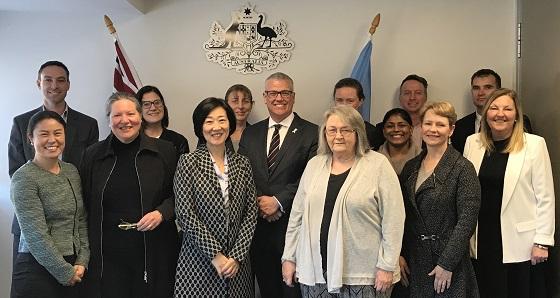WPS 2018: Civil society participation in WPS governance in Australia
Posted By Anu Mundkur and Laura J. Shepherd on March 16, 2018 @ 12:30

This article is the fourth in a series on ‘Women, Peace and Security’ that The Strategist will publish over coming weeks in recognition of International Women’s Day 2018. Eds.
In Australia, civil society organisations (CSOs) and individuals are deeply engaged in advocacy, lobbying and activism in women, peace and security (WPS) governance. For example, the campaign for the Australian National Action Plan on Women, Peace and Security 2012–2018 [1] (NAP) was led by the Australian section of the Women’s International League of Peace and Freedom (WILPF) and UNIFEM Australia (now UN Women Australia) working with other locally based CSOs.
The advocacy work that laid the foundation for the NAP dates back to 2004 when WILPF received funding from the Commonwealth Office for Women to develop an Australian website promoting UN Security Council Resolution 1325, which highlighted the disproportionate effects of armed conflict on women and girls.
But despite their vital role in pushing for the national adoption of the WPS agenda, CSOs have no clear role in the NAP. This contrasts sharply with practice elsewhere [2]:
[W]hereas in some NAPs, civil society is a cosignatory (such as in the Netherlands) or an implementing agency (such as in the Pacific Regional Action Plan), the Australian NAP does not explicitly mention civil society as responsible for any implementing actions.
Instead, CSOs are vaguely encouraged to develop shadow reports on progress. This restricted ‘watchdog’ function, however, comes without the power and resources required to effectively play this role.
So CSOs were left to create their own engagement with the NAP. This has taken two forms. First, the Annual Civil Society Dialogues and the Annual Civil Society Report Cards (funded by the Australian Civil-Military Centre) provide opportunities to talk about WPS and to present an implementation progress assessment.
Second, civil society has successfully lobbied to be represented on the inter-departmental working group that governs NAP. Even so, this representation doesn’t necessarily translate into meaningful opportunities to influence decisions and actions.
Women and women’s CSOs should have the right to participate in WPS governance because they have expertise that will help to meet the NAP’s goals and objectives. In Australia, there’s increasing evidence that expertise legitimises and secures the participation of civil society in peace and security governance.
WPS engagement in Australia is primarily driven by the CSOs in the Australian Civil Society Coalition on Women Peace and Security [3]. The coalition ‘brings together activists, feminists, practitioners, humanitarian actors and those with first-hand experience working in the frontline on issues relating to women, peace and security. Coalition members have wide ranging expertise in gender and peace.’
The coalition has organised a series of community engagement roundtables [4] ‘to provide opportunity for the diverse women living in Australia and our region to express their views on what peace and security means in practice’. The intention is to anchor the next phase of Australian WPS policymaking in the voices, experiences and expertise of civil society.
That is a clear manifestation of the principle that civil society ownership of the WPS agenda means that civil society should participate in WPS governance. The coalition’s recent report, Listening to women’s voices and making the connections to the women, peace and security agenda [5] highlights four key elements for developing a robust WPS framework and 12 critical issues the next NAP should address.
One of those is improving accountability. Poorly articulated mechanisms limit the extent to which government stakeholders in Australia can be held accountable to NAP commitments. In the case of Australia’s NAP, poor accountability is compounded by an anaemic monitoring and evaluation framework [6] that relies on descriptions of actions taken rather than on outcomes.
Furthermore, allowing CSOs to participate could lead to higher levels of accountability. As mentioned previously, CSOs are currently only ‘encouraged to develop shadow progress reports’. Where this process fits within the overall framework of the NAP’s monitoring, evaluation and reporting framework isn’t identified. Neither is there any direction provided on what this shadow reporting process should involve, how the government will respond, or how those evaluations will be funded.
For Australia’s next NAP, CSOs are looking to significantly improve accountability through four distinct but interrelated measures. The first is to include CSO annual reports in the NAP’s overall reporting mechanism. The second would require that CSOs receive dedicated resources to support their reporting. The third is to table the annual report cards in Parliament. And the fourth is to require a formal response from the Australian government to the recommendations made in the report cards.
The lessons learned from Australia’s experience could usefully inform practice in other places, and enable improvements in civil society participation in the governance and implementation of WPS initiatives in Australia.
More broadly, taking seriously—and making possible, including through funding and direct consultation—women’s civil society participation in WPS governance is essential to ensure the agenda’s continued resonance, legitimacy and efficacy in world politics.
Article printed from The Strategist: https://aspistrategist.ru
URL to article: /wps-2018-civil-society-participation-wps-governance-australia/
URLs in this post:
[1] Australian National Action Plan on Women, Peace and Security 2012–2018: https://www.dss.gov.au/sites/default/files/documents/05_2012/aus_nap_on_women_2012_2018.pdf
[2] contrasts sharply with practice elsewhere: http://www.tandfonline.com/doi/pdf/10.1080/10357718.2014.903895
[3] Australian Civil Society Coalition on Women Peace and Security: https://wpscoalition.org/
[4] community engagement roundtables: http://wpscoalition.org/reports-publications/
[5] Listening to women’s voices and making the connections to the women, peace and security agenda: http://wpscoalition.org/wp-content/uploads/2018/03/CivilSociety_2018_report_ART_web.pdf
[6] anaemic monitoring and evaluation framework: http://journals.sagepub.com/doi/pdf/10.1177/0192512116629821
Click here to print.